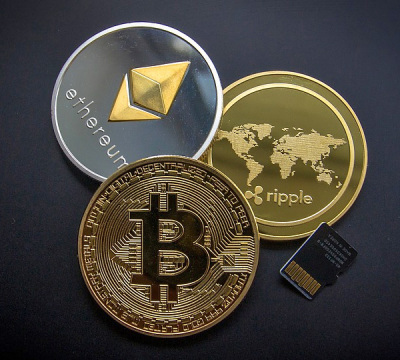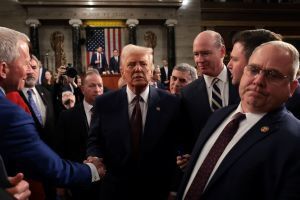Crypto currencies are inherently fraudulent

Famous investor Warren Buffett has concluded Bitcoin will “come to a bad end.” His business colleague Charlie Munger has been even more forthright, stating cryptocurrencies are “rat poison” and “detrimental to civilization.”
The businessmen’s concerns are justified. Like fiat monies backed only by governmental authority, crypto is created out of thin air.
As Bitcoin site states, cryptocurrency is “based on the properties of mathematics rather than relying on physical properties (like gold and silver) or trust in central authorities (like fiat currencies).” Sumit Gupta, co-founder and Chief Executive Officer of CoinDCX, has stated, “Bitcoin has no intrinsic value … Bitcoin or any other cryptocurrency doesn’t have a solid counterpart. It is purely digital in nature.”
Cryptocurrency is “real” money only in the way Minecraft money is real. Within Minecraft’s digital world, imaginary battles are fought, pretend civilizations are built and destroyed; and invented monies are made and spent. YouTube tutorials such as “How to make money system, shop, and sell in Minecraft PE;” and, “If You Build It, I’ll Pay for It!” provide instructions.
The idea that self-created narratives speak realities, including wealth, into existence has always been appealing. Creating a secret language and speaking a fantasy world into existence is characteristic of many children. Most children outgrow such fantasies, but some reach adulthood still clinging to the idea that a secret language can create an alternate reality that excludes the world of established and authoritative institutions such as family, governments, and churches. The inventors of cryptocurrencies speak in the secret language of codes and algorithms.
The fact algorithms are abstract intellectual inventions producing nothing material does not seem to bother the creators of cryptocurrencies, as mathematical logos are seen as a narrative creating an alternate universe. As a spokesman for Abracadabra has stated, “Of course it’s happening in your head … but why on earth should that mean it is not real?”
Complete detachment of money from its earthly moorings may be why the Abracadabra site speaks of “conjuring up some magic internet money,” describing stratagems on how to cast “spells” that unlock “keys” to wealth. It is interesting to note that some scholars say that “abracadabra” is a corruption of the Hebrew, ebrah k'dabri, meaning “I will create as I speak.” In other words, speech will magically create new realities.
The metaphysics of codes and algorithms foundational to crypto has been succinctly summarized by Tyler Winklevoss, founder of the Gemini cryptocurrency exchange. He states, “We have elected to put our money and faith in a mathematical framework that is free of politics and human error.”
Winklevoss, perhaps unwittingly, has put his finger on another major problem concerning the ontological mathematics of cryptocurrencies. No system of money is free from human error.
The idea of incorruptible monies is a gnostic attempt to put Mammon on a spiritual plane far removed from the supposedly inherent and irredeemably venal materiality of earthly institutions. Immutable blockchain tech will make the conduits of money sin free and will guarantee total freedom and equality for everyone.
Where there is infallibility and freedom from human error there is the lure of the divine — a Promised Land or a Peaceable Kingdom. An incorruptible money derived from an incorruptible, mathematical foundation appeals to supranational organizations pushing claims of global significance.
But mathematics is not an incorruptible means of creating material reality. It is not divine logos that speak anything into existence, including money.
On the contrary, as Immanuel Kant pointed out in The Critique of Judgment, mathematics creates absolutely nothing. Mathematics merely points to material reality. It is human desire that crosses the bridge of pure mathematics, causing the object mathematics points to as becoming “real.”
The belief of investors/miners is that at the end of all the vast expenditure of time and energy is a pot of gold. Their strenuous efforts remind one of the attempts to find El Dorado by finding “X” on the top-secret map; to discover the Fountain of Youth by slogging through uncharted territory, or to achieve the Midas touch through secret alchemic formulae. Magical incantations of codes and algorithms are the “Open Sesame” unlocking the door leading to unimaginable treasures.
But claims of infallibility coupled with the requirement of absolute faith are routinely employed by creators of fraudulent schemes producing nothing of value. As pragmatist Warren Buffet points out, “It's ingenious and blockchain is important but Bitcoin has no unique value at all, it doesn't produce anything. You can stare at it all day and no little Bitcoins come out or anything like that. It's a delusion basically.”
Crypto seeks to enable escape into a cybersphere establishing an illusory economy. But it is the currency of progressive nihilism, an ideology that desires the collapse of all earthly institutions in favor of an unknown future utopia.
Church leaders may want to hesitate before committing themselves to yet another permutation of an ancient heresy. Political leaders may want to pause before they embrace gnostic economics.
Charlie Munger is correct. “Bitcoin and the computer science behind it is a triumph of the mind and that’s what captivates all these people. (But) I see an artificial speculation medium that has no intrinsic value. It’s immoral. It has no desirable social purpose. It is a combination of dementia and immorality and I think the people that are pushing it are a disgrace.”
Buffet and Munger understand the concept of real money. Money, like the people it serves as a means of efficiently transacting goods and services, should be and is of and from the earth. Money should once again be attached to material realities such as scarce but producible and tangible materials like gold or silver. Both fiat and cryptocurrencies must be rejected as spurious.
Fay Voshell holds a M.Div. from Princeton Theological Seminary, which awarded her the prize for excellence in systematic theology. Her thoughts have appeared in numerous online magazines, including National Review, American Thinker, Russia Insider, CNS, RealClearReligion, LifeSiteNews and The Christian Post. She may be reached at fvoshell@yahoo.com.




























